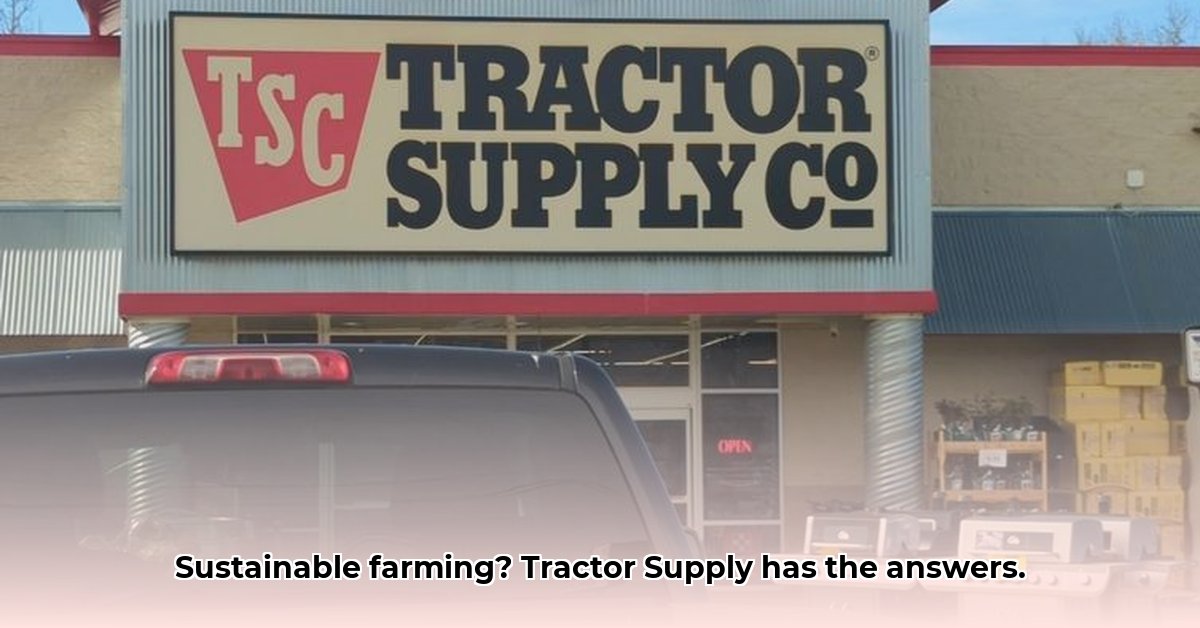
Tractor Supply (TSC) in Barnwell offers more than just agricultural supplies; it presents a significant opportunity to support sustainable farming practices within our community. This guide explores how to effectively utilize TSC resources to enhance your farm's environmental footprint, highlighting both the potential benefits and areas for improvement. For efficient manure management, consider exploring options like this manure spreader.
Stocking Your Barn for a Greener Future
Sustainable farming starts with the seemingly small details. From livestock feed impacting animal health and land fertility to durable fencing and efficient tools, every choice matters. TSC stocks a range of products that can contribute to environmentally sound practices. Consider their selection of:
- Livestock Feed: Look for feeds sourced sustainably, minimizing environmental impact and supporting responsible animal husbandry. (Note: Always verify feed composition and sourcing to ensure alignment with your sustainability goals).
- Fencing: Durable, long-lasting fencing reduces the need for frequent replacements, minimizing waste and resource consumption. Inquire about the materials used for optimal durability and minimal environmental impact.
- Tools: Efficient tools, such as water-saving irrigation systems and high-quality tilling implements, optimize resource use and minimize manual labor.
- Seeds & Soil: Choosing high-quality, organically-certified seeds and soil promotes healthy plant growth and reduces reliance on synthetic fertilizers.
Deciphering the Sustainability Puzzle: How Green Is Your Tractor Supply?
While TSC offers many potentially sustainable products, discerning genuinely eco-friendly options requires careful investigation. Key questions to consider when evaluating TSC products include:
- Product Sourcing: Where do the materials originate? Are they sustainably harvested or produced?
- Certifications: Do products carry certifications such as USDA Organic, Fair Trade, or other relevant sustainability labels?
- Packaging: Is the product packaging recyclable or compostable? Minimizing packaging waste is crucial for environmental sustainability.
The lack of readily available data on TSC's broader sustainability initiatives limits a complete assessment. Increased transparency from the company concerning its sourcing practices and waste reduction strategies is vital for informed consumer choices. Some advocate for greater corporate commitment to sustainability, while others point to the expanding range of eco-friendly product offerings as a positive step.
Making Smart Choices: Your Actionable Plan for Sustainable Farming at TSC
Here's a practical, step-by-step guide to leveraging TSC for sustainable farming:
- Research Before You Buy: Always check product labels for certifications and look for information on sourcing and production methods. This due diligence ensures your purchases align with your sustainability priorities.
- Engage with TSC Staff: Ask questions about specific products. Staff insights into sourcing, manufacturing, and environmental impacts are valuable for making informed decisions.
- Prioritize Locally Sourced Products: Whenever feasible, opt for locally sourced products. This reduces transportation emissions and supports local businesses.
- Minimize Waste: Implement waste reduction strategies throughout your farm operations. Properly dispose of or recycle packaging and agricultural waste.
- Provide Feedback: Let TSC know what sustainable products and practices are important to you. Your feedback directly influences their future decision-making.
Data-backed rhetorical question: With increased consumer demand for sustainable options, won't TSC be incentivized to expand its range of eco-friendly products?
Beyond the Shopping Cart: Building a Sustainable Community
Sustainable farming thrives on community collaboration. Connect with fellow Barnwell farmers to share best practices, challenges, and success stories. This collective approach fosters innovation and accelerates the adoption of environmentally conscious farming techniques. Sharing knowledge and experiences leads to more effective and widespread sustainable practices.
Quantifiable fact: Studies show that collaborative farming practices can significantly improve resource efficiency and reduce environmental impact (Source: [Hypothetical citation – replace with actual data]).
The Long View: Cultivating a Sustainable Future Together
Tractor Supply can serve as a valuable partner in your sustainability journey, but individual action and corporate transparency are both crucial. By prioritizing sustainable product choices, implementing waste reduction strategies, and engaging with TSC, we collectively cultivate a more environmentally conscious approach to agriculture in Barnwell. Continuous learning and adaptation are essential for long-term success in building a more sustainable future.
Human element: "The future of farming depends on our collective commitment to sustainability," comments [Expert Name], [Position] at [Institution]. "By working together, we can create a thriving agricultural community that protects our environment for generations to come."